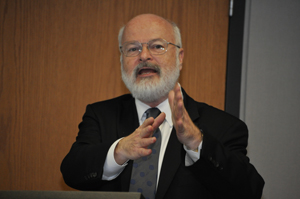Nelson tells Urban Fellows of ‘decade of calamity’ for housing market
 May 10, 2011
May 10, 2011
ATLANTA – The United States could be looking at a “decade of calamity” as forecasts call for a huge shift in housing from a market where homeownership greatly dominated to one where the demand for rental housing skyrockets, a visiting professor recently told an audience at Georgia State University College of Law.
Dr. Chris Nelson, Presidential Professor of City and Metropolitan Planning and Director of the Metropolitan Research Center at the University of Utah, recently spoke to the College of Law’s Urban Fellows about how America’s changing demographics, shifts in housing preference, and current economic climate will reshape America’s communities in the next 20 years.
With the mortgage crisis and foreclosures in the last decade, the shift in home ownership has already begun – since the peak in 2005, homeownership has fallen from 69 percent to a current rate of 66 percent, said Nelson, who holds a Ph.D. in Urban Studies from Portland State University.
“We could be at 60 percent home ownership by 2020,” said Nelson, who has conducted pioneering research in growth management, urban containment, public facility finance, economic development and metropolitan development patterns. “This means we will fall backwards in terms of the number of homes owned from 79 million in 2010 to 78 million in 2020. And we are a growing country, adding 1 million new households each year. This would mean that all new demand would have to be satisfied by rental housing, not ownership housing.”
If this happens, Nelson expects the demand for rental housing units to expand by 112 percent. Nelson isn’t the only one painting such a gloomy picture. Even the most optimistic estimates place home ownership at only 63 percent by 2020, with rental demand increasing dramatically by 73 percent.
America’s changing demographics over the next 20 years further contributes to the shifts in housing. In 1970, 45 percent of households had children, Nelson noted, whereas by 2030, he predicts that only 27 percent of households will have children. He also predicts single-person households to rise dramatically by 2030 to 34 percent, up from only 14 percent in 1970.
Nelson pointed to the aging of the America’s baby boomer generation as a major factor, accounting for 47 percent of this demographic shift. He explained that seniors further contribute to the housing shift by moving as they age. His analysis of research conducted by the American Housing Survey indicates that 60 percent of seniors change housing type between the ages of 60 and 85, with 59 percent choosing to move into apartments.
These dramatic demographic changes will impact housing selection and home design over the next decade, Nelson said. He pointed to his own research, which shows that in the next 10 years, 90 percent of the growth in the housing market will be from households without children, 36 percent of which will be from single-person households.
“From the 1950s to 1990s, we designed American suburbs through zoning and subdivision codes to accommodate families with children,” Nelson said. “That kind of model is outdated. We need to redesign our suburbs to cater to people without children, and even single-person households, who have a very different perspective on what they want for housing.”
Nelson’s recent research sheds even more light on how America’s communities will change in the next decade. His message to the Urban Fellows was simple: “We are seeing some very interesting trends emerge in housing preferences.”
People want transit-supportive neighborhoods – densities that support buses, light rail, or trolleys as an option. Demand is rising for smaller homes, smaller lots and attached housing; the demand for million dollar homes has tanked. There is a huge desire for mixed-use communities in both the city and suburban areas. Nelson encouraged Urban Fellows to stay cognizant of these trends as they become attorneys, urban planners, and involved in community development.
By Karen Johnson, Assistant Director
Center for the Comparative Study of Metropolitan Growth
Contact:
Wendy Cromwell
Director of Communications
404.429.4650